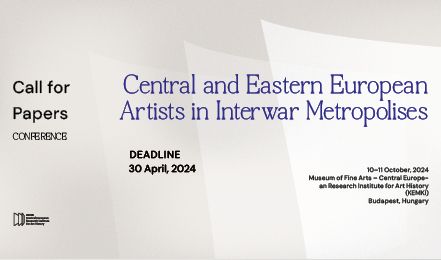‘metropolises’
Elérhetőek a Central and Eastern European Artists in Interwar Metropolises konferencia előadásai
The recordings of the international conference, held in 2024 in connection with the „Organising the Spectacle” Research on the Avant-garde organized by the Research Department, are now available on the conference website and on the KEMKI Youtube channel . Feel free to explore!
Angela Lampe: The Cold Order: A Review of Exhibition Germany/1920s/ New Objectivity/August Sander - Sociological Aspects of the Interwar Years
… of this new cold order, which, in the interwar years, particularly conditioned life in German metropolises. As Robert Musil summed up in 1930 in his great novel Der Mann ohne Eigenschaften (The Man Without Qualities), “One has gained reality and lost dreams.” Angela Lampe began her career at the Kunsthalle Bielefeld in Germany after a PhD in art history at the Sorbonne University Paris. Since 2005 she is a curator of the modern art collections at the Musée National d’Art Moderne/ …
Éva Forgács: Challenging National Art Histories
The great number of émigrés in the interwar period challenges the concept of national art historical narratives. If an artist, having been raised and educated in Hungary, chooses to live in France, Germany, or the US, to which country’s culture does s/he belong? Does artistic formation weigh as much as the new context that allowed him/her to develop as an artist? Can his/her achievements be …
Central and Eastern European Artists in Interwar Metropolises
… 13.40–14.00 Sára Bárdi, KEMKI, Budapest: State Representation of Hungary in Interwar Metropolises: Exhibition Design and the Foreign Trade Office 14.00–14.20 Bálint Juhász, Hansági Museum, Hungary: Visual Language as a Socio-Political Tool. The Irreprehensible and Anti-Cosmopolitan Crusade of Štefan Prohászka (1928–1938) 14.20–14.40 Bennett Tucker, Israel Institute of Technology: Reuven Rubin and the Interrelations of Artist Sponsorships and Institutional Networks in New …
CFP: Central and Eastern European Artists in Interwar Metropolises
… or actors generated by private (family, friends) social capital. The social relations of modern metropolises were shaped by industrialisation, urbanisation, changing conditions of work and leisure, developing infrastructure, housing shortages and emerging platforms of the public sphere. We invite researchers who explore this interaction between artistic production, emigration and the urban space from aspects including but not limited to: the impact of artists’ access to typical or …




